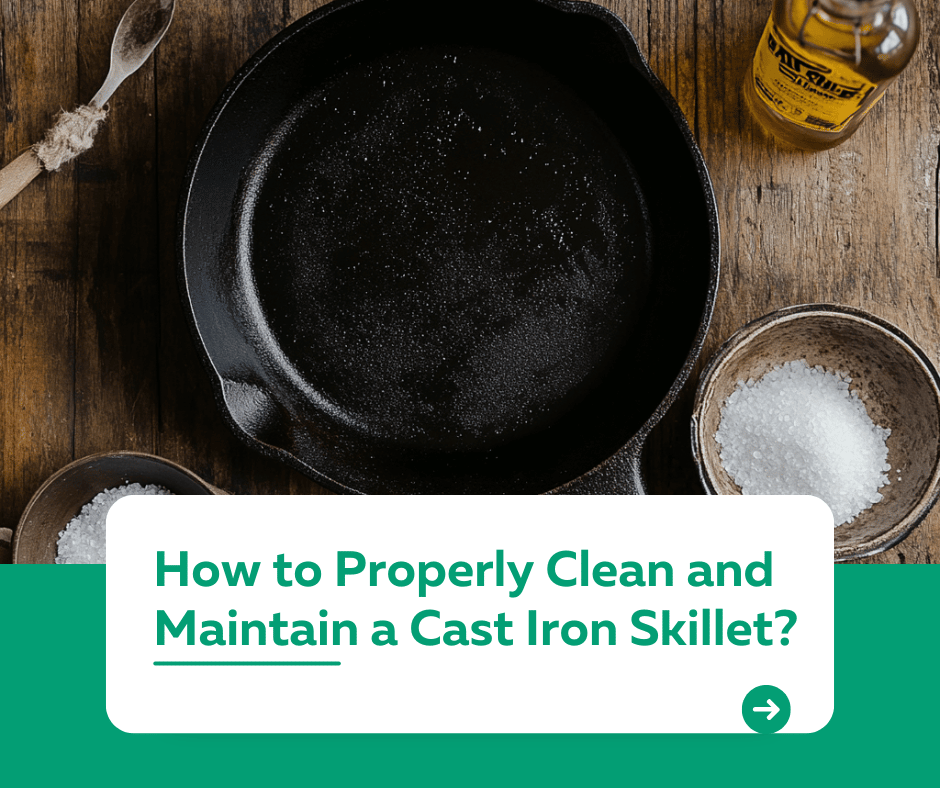
Introduction
“How do you clean and maintain a cast iron skillet?”
A cast iron skillet is a timeless kitchen tool, known for its durability and exceptional cooking performance. However, it requires proper care to ensure it lasts a lifetime. In this guide, we’ll walk you through the best practices for cleaning, maintaining, and restoring your cast iron skillet.
1. Why Proper Care Is Important
Cast iron skillets are incredibly durable, but improper care can lead to rust, loss of seasoning, and reduced performance.
- Benefits of Proper Maintenance:
- Preserves the skillet’s non-stick surface.
- Prevents rust and extends its lifespan.
- Enhances the flavor of your dishes over time.
2. How to Clean a Cast Iron Skillet After Use
Cleaning your skillet correctly after each use is essential to maintain its seasoning.
Steps to Clean:
1️⃣ Allow the skillet to cool slightly after cooking but clean it while it’s still warm.
2️⃣ Use warm water and a soft sponge or brush to remove food residue.
3️⃣ Avoid using soap unless absolutely necessary, as it can strip the seasoning.
4️⃣ For stubborn stuck-on bits, use coarse salt as a gentle abrasive.
Tip: Never soak your cast iron skillet in water—it can lead to rust!
3. How to Dry and Re-season Your Skillet
After cleaning, drying and re-seasoning your skillet are crucial steps.
Steps to Dry:
- Immediately dry the skillet with a clean towel.
- Place it on low heat for a few minutes to evaporate any remaining moisture.
Steps to Re-season:
- Apply a thin layer of oil (vegetable or flaxseed oil works well) to the entire surface.
- Use a paper towel to evenly distribute the oil and remove excess.
- Heat the skillet on the stove or in the oven for 10–15 minutes to bond the oil to the surface.
4. How to Restore a Rusty Cast Iron Skillet
If your skillet has rusted, don’t worry—it can be restored!
Steps to Restore:
1️⃣ Scrub the skillet with steel wool to remove rust.
2️⃣ Wash with warm water and mild soap (this is an exception to the no-soap rule).
3️⃣ Dry thoroughly and re-season as described above.
Tip: Regular maintenance prevents rust, so make it a habit to dry and oil your skillet after each use.
5. Long-Term Maintenance Tips
- Avoid cooking acidic foods (like tomato sauce) in a new skillet until it’s well-seasoned.
- Use your skillet often—the more you use it, the better the seasoning becomes.
- Store in a dry place, and if stacking with other cookware, place a paper towel between items to protect the surface.
Conclusion
Cleaning and maintaining a cast iron skillet doesn’t have to be complicated. With proper care, your skillet will last for generations, delivering delicious, evenly cooked meals every time.
For more kitchen tips and cooking techniques, visit our Kuestion.com.